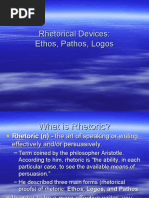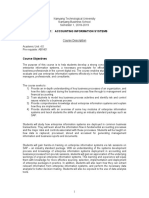0 ratings0% found this document useful (0 votes)
106 viewsEthos, Pathos, Logos: 3 Pillars of Public Speaking: Andrew Dlugan
Ethos, Pathos, Logos: 3 Pillars of Public Speaking: Andrew Dlugan
Uploaded by
cccqThe document summarizes Aristotle's three pillars of public speaking: ethos, pathos, and logos. It explains that ethos refers to the credibility of the speaker, pathos refers to emotionally connecting with the audience, and logos refers to using logical arguments. The document was originally written by Aristotle over 2300 years ago but these concepts still form the basis of public speaking. It provides further details on each concept and debates whether ethos, pathos, or logos is most important for an effective speech.
Copyright:
© All Rights Reserved
Available Formats
Download as DOCX, PDF, TXT or read online from Scribd
Ethos, Pathos, Logos: 3 Pillars of Public Speaking: Andrew Dlugan
Ethos, Pathos, Logos: 3 Pillars of Public Speaking: Andrew Dlugan
Uploaded by
cccq0 ratings0% found this document useful (0 votes)
106 views5 pagesThe document summarizes Aristotle's three pillars of public speaking: ethos, pathos, and logos. It explains that ethos refers to the credibility of the speaker, pathos refers to emotionally connecting with the audience, and logos refers to using logical arguments. The document was originally written by Aristotle over 2300 years ago but these concepts still form the basis of public speaking. It provides further details on each concept and debates whether ethos, pathos, or logos is most important for an effective speech.
Original Title
Ethos
Copyright
© © All Rights Reserved
Available Formats
DOCX, PDF, TXT or read online from Scribd
Share this document
Did you find this document useful?
Is this content inappropriate?
The document summarizes Aristotle's three pillars of public speaking: ethos, pathos, and logos. It explains that ethos refers to the credibility of the speaker, pathos refers to emotionally connecting with the audience, and logos refers to using logical arguments. The document was originally written by Aristotle over 2300 years ago but these concepts still form the basis of public speaking. It provides further details on each concept and debates whether ethos, pathos, or logos is most important for an effective speech.
Copyright:
© All Rights Reserved
Available Formats
Download as DOCX, PDF, TXT or read online from Scribd
Download as docx, pdf, or txt
0 ratings0% found this document useful (0 votes)
106 views5 pagesEthos, Pathos, Logos: 3 Pillars of Public Speaking: Andrew Dlugan
Ethos, Pathos, Logos: 3 Pillars of Public Speaking: Andrew Dlugan
Uploaded by
cccqThe document summarizes Aristotle's three pillars of public speaking: ethos, pathos, and logos. It explains that ethos refers to the credibility of the speaker, pathos refers to emotionally connecting with the audience, and logos refers to using logical arguments. The document was originally written by Aristotle over 2300 years ago but these concepts still form the basis of public speaking. It provides further details on each concept and debates whether ethos, pathos, or logos is most important for an effective speech.
Copyright:
© All Rights Reserved
Available Formats
Download as DOCX, PDF, TXT or read online from Scribd
Download as docx, pdf, or txt
You are on page 1of 5
Ethos, Pathos, Logos:
3 Pillars of Public Speaking
by Andrew Dlugan
Published: Jan 24th, 2010
2300 years ago, Aristotle wrote down the secret to being a
persuasive speaker, the secret which forms the basis for nearly
every public speaking book written since then.
Do you know the secret?
If you don’t, you might be wondering what a 2300-year-old
theory has to do with public speaking in the year 2010.
In a word — everything!
In this article, you’ll learn what ethos, pathos, and logos are
(the secret!), and what every speaker needs to understand about
these three pillars of public speaking.
What are Ethos, Pathos, and Logos?
So, what are ethos, pathos, and logos?
In simplest terms, they correspond to:
▪ Ethos: credibility (or character) of the speaker
▪ Pathos: emotional connection to the audience
▪ Logos: logical argument
Together, they are the three persuasive appeals. In other words,
these are the three essential qualities that your speech or
presentation must have before your audience will accept your
message.
Origins of Ethos, Pathos, Logos — On
Rhetoric by Aristotle
Three Pillars of Public Speaking
1 Ethos, Pathos, Logos - Introduction
2 Ethos - Speaker Credibility
▪ What is Ethos?
▪ How to Establish Ethos
3 Pathos - Emotional Connection
▪ What is Pathos?
▪ How to Develop Pathos
4 Logos - Logical Argument
▪ What is Logos?
▪ How to Convey Logos
Written in the 4th century B.C.E., the Greek philosopher Aristotle
compiled his thoughts on the art of rhetoric into On Rhetoric,
including his theory on the three persuasive appeals.
Many teachers of communication, speech, and rhetoric consider
Aristotle’s On Rhetoric to be a seminal work in the field. Indeed,
the editors of The Rhetoric of Western Thought: From the
Mediterranean World to the Global Setting call it “the most
important single work on persuasion ever written.” It is hard to
argue this claim; most advice from modern books can be traced
back to Aristotle’s foundations.
In The Classic Review, Sally van Noorden points to George
Kennedy’s modern translation as the standard reference text for
studying On Rhetoric. Kennedy’s translation is the source
that I use. (At the time of this writing, it is available from
amazon.com for $24.56, 18% off the list price.)
Ethos
Before you can convince an audience to accept anything you say,
they have to accept you as credible.
There are many aspects to building your credibility:
▪ Does the audience respect you?
▪ Does the audience believe you are of good character?
▪ Does the audience believe you are generally trustworthy?
▪ Does the audience believe you are an authority on this speech
topic?
Keep in mind that it isn’t enough for you to know that you are a
credible source. (This isn’t about your confidence, experience, or
expertise.) Your audience must know this. Ethos is your level of
credibility as perceived by your audience.
We will define ethos in greater detail, and we will study examples
of how to establish and build ethos.
Pathos
Pathos is the quality of a persuasive presentation which appeals
to the emotions of the audience.
▪ Do your words evoke feelings of … love? … sympathy? … fear?
▪ Do your visuals evoke feelings of compassion? … envy?
▪ Does your characterization of the competition evoke feelings of
hate? contempt?
Emotional connection can be created in many ways by a speaker,
perhaps most notably by stories. The goal of a story, anecdote,
analogy, simile, and metaphor is often to link an aspect of our
primary message with a triggered emotional response from the
audience.
We will study pathos in greater detail, and look at how to build
pathos by tapping into different audience emotions.
Logos
Logos is synonymous with a logical argument.
▪ Does your message make sense?
▪ Is your message based on facts, statistics, and evidence?
▪ Will your call-to-action lead to the desired outcome that you
promise?
We will see why logos is critical to your success, and examine
ways to construct a logical, reasoned argument.
Which is most important? Ethos?
Pathos? or Logos?
Suppose two speakers give speeches about a new corporate
restructuring strategy.
▪ The first speaker — a grade nine student — gives a flawless
speech pitching strategy A which is both logically sound and
stirs emotions.
▪ The second speaker — a Fortune 500 CEO — gives a boring
speech pitching strategy B.
Which speech is more persuasive? Is the CEO’s speech more
persuasive, simply because she has much more credibility
(ethos)?
Some suggest that pathos is the most critical of the three. In
You’ve Got to Be Believed to Be Heard, Bert Decker says that
people buy on emotion (pathos) and justify with fact (logos).
True? You decide.
Aristotle believed that logos should be the most important of the
three persuasive appeals. As a philosopher and a master of
logical reasoning, he believed that logos should be the only
required persuasive appeal. That is, if you demonstrated logos,
you should not need either ethos or pathos.
However, Aristotle stated that logos alone is not sufficient. Not
only is it not sufficient on its own, but it is no more important
than either of the two other pillars. He argued that all three
persuasive appeals are necessary.
Is he right? What do you think?
You might also like
- Sharon E. J. Gerstel Beholding The Sacred MysterDocument224 pagesSharon E. J. Gerstel Beholding The Sacred MysterMarko Marusic0% (2)
- The Level-of-Analysis Problem in International Relations (1961)Document17 pagesThe Level-of-Analysis Problem in International Relations (1961)Temporary AccountNo ratings yet
- Rhetoric PowerPoint-Ethos, Pathos, LogosDocument9 pagesRhetoric PowerPoint-Ethos, Pathos, LogosKhanifa BarringtonNo ratings yet
- Nanyang Business School AB1201 Financial Management Seminar Questions Set 4: Bonds and Their Valuation (Common Questions)Document3 pagesNanyang Business School AB1201 Financial Management Seminar Questions Set 4: Bonds and Their Valuation (Common Questions)cccqNo ratings yet
- Am Is Are Has Have - 8030Document2 pagesAm Is Are Has Have - 8030Roxana Neamtiu0% (1)
- The Liturgy of The Avodat HaKodeshDocument12 pagesThe Liturgy of The Avodat HaKodeshSeth WardNo ratings yet
- Ssat Reading and WritingDocument288 pagesSsat Reading and Writingcokihihihi100% (8)
- Structure at Google LLCDocument6 pagesStructure at Google LLCRimsha KhanNo ratings yet
- Ethos Pathos Logos Thesis StatementDocument7 pagesEthos Pathos Logos Thesis StatementBrittany Allen100% (2)
- Ethos, Pathos, and LogosDocument5 pagesEthos, Pathos, and LogosJuliana HoNo ratings yet
- A General Summary of Aristotle RethoricDocument10 pagesA General Summary of Aristotle Rethoricharsapermata100% (1)
- Ethos Pathos LogosDocument8 pagesEthos Pathos LogosHafizul IdhamNo ratings yet
- Ethos Logos Pathos: Successful Arguments The Aristotle Way: Ethos: Man's Morals and HabitsDocument4 pagesEthos Logos Pathos: Successful Arguments The Aristotle Way: Ethos: Man's Morals and HabitsairelliottNo ratings yet
- Optional: More On The Rhetorical Canons: Definitions of RhetoricDocument5 pagesOptional: More On The Rhetorical Canons: Definitions of RhetorickiranNo ratings yet
- Ethos, Logos, PathosDocument3 pagesEthos, Logos, PathosZakaria LahrachNo ratings yet
- RhetoricDocument3 pagesRhetoricHemera Fernanda FariasNo ratings yet
- Ethos Pathos Logos PresentationDocument12 pagesEthos Pathos Logos PresentationiolandaNo ratings yet
- Ethos Pathos LogosDocument11 pagesEthos Pathos LogosstupicasNo ratings yet
- The Power of PersuasionDocument10 pagesThe Power of Persuasionthornapple25No ratings yet
- 3 Pillars of Public SpeakingDocument9 pages3 Pillars of Public Speakingvkm_ctrNo ratings yet
- RhetoricDocument2 pagesRhetoricMartin-Garcia Guayubin-MontecristiNo ratings yet
- Unit 2 Slides AdvancedDocument56 pagesUnit 2 Slides Advancedvpanth350No ratings yet
- Aristotle's Three Forms of Persuasion Ethos: Metaphor SimileDocument1 pageAristotle's Three Forms of Persuasion Ethos: Metaphor SimileamborddNo ratings yet
- ThreewaystopersuadeDocument10 pagesThreewaystopersuadeapi-278483392No ratings yet
- Argument, Rhetoric, and WritingDocument7 pagesArgument, Rhetoric, and WritingMaggie VZNo ratings yet
- Ethos, Pathos, Logos Resource and Definition Guide: March 23-27 Distance Learning 8 Grade English: Persuasive SpeechDocument12 pagesEthos, Pathos, Logos Resource and Definition Guide: March 23-27 Distance Learning 8 Grade English: Persuasive SpeechQysha NagalingamNo ratings yet
- Ethos Pathos and LogosDocument10 pagesEthos Pathos and LogosMohammed MahdiNo ratings yet
- Elements of RhetoricDocument17 pagesElements of RhetoricZi Wei ZNo ratings yet
- Five Main Parts of RhetoricDocument3 pagesFive Main Parts of RhetoricEmaFYNo ratings yet
- Rhetoric+PowerPoint Ethos,+Pathos,+LogosDocument12 pagesRhetoric+PowerPoint Ethos,+Pathos,+Logosthomasd14No ratings yet
- Logos, Pathos & Ethos (Edited)Document5 pagesLogos, Pathos & Ethos (Edited)ladybug lyxxNo ratings yet
- Ethos Logos PathosDocument1 pageEthos Logos PathosUracoa EfeEmeNo ratings yet
- Public Speaking Class 1Document3 pagesPublic Speaking Class 1contactcelinedaaboulNo ratings yet
- ENGL101 - Rhetorical Triangle Reference GuideDocument2 pagesENGL101 - Rhetorical Triangle Reference GuideDeb TracyNo ratings yet
- The Rhetorical Triangle The Fundamentals of Effective Persuasive WritingDocument1 pageThe Rhetorical Triangle The Fundamentals of Effective Persuasive WritingJohn LukezicNo ratings yet
- The Aristotelian AppealsDocument1 pageThe Aristotelian Appealsapi-277501178No ratings yet
- Introduction To RhetoricDocument39 pagesIntroduction To Rhetoricمصطفى كاظمNo ratings yet
- Rhetoric PowerPoint-Ethos, Pathos, LogosDocument9 pagesRhetoric PowerPoint-Ethos, Pathos, LogosKhanifa BarringtonNo ratings yet
- Rhetoric PowerPoint-Ethos, Pathos, LogosDocument9 pagesRhetoric PowerPoint-Ethos, Pathos, LogosKhanifa BarringtonNo ratings yet
- Rhetoric PowerPoint-Ethos, Pathos, LogosDocument9 pagesRhetoric PowerPoint-Ethos, Pathos, LogosKhanifa BarringtonNo ratings yet
- Rhetoric PowerPoint-Ethos, Pathos, LogosDocument9 pagesRhetoric PowerPoint-Ethos, Pathos, LogosKhanifa BarringtonNo ratings yet
- NOTES 5 Logos Ethos Pathos PowerpointDocument16 pagesNOTES 5 Logos Ethos Pathos PowerpointBakhita KiaraNo ratings yet
- Secsem Theater ShetDocument8 pagesSecsem Theater ShetSpearBNo ratings yet
- Logos, Ethos, PathosDocument17 pagesLogos, Ethos, PathosJoe EliaNo ratings yet
- Aristotelian ArgumentDocument58 pagesAristotelian ArgumentJosé Miguel NajulNo ratings yet
- Glue and ReasonDocument6 pagesGlue and Reasonstormcrow01No ratings yet
- RhetoricDocument9 pagesRhetoriczubaida alaniNo ratings yet
- Thesis Statement Using EthosDocument4 pagesThesis Statement Using Ethosjennifermarietopeka100% (2)
- Rhetorical ResponseDocument4 pagesRhetorical ResponseNacho BusinessNo ratings yet
- That Do Not Exist, Only Interpretations: Things Questions My AnswersDocument5 pagesThat Do Not Exist, Only Interpretations: Things Questions My AnswersTaylor Aitken100% (1)
- The Rhetorical Triangle or Aristotelian TriadDocument2 pagesThe Rhetorical Triangle or Aristotelian TriadvladaputoNo ratings yet
- Aristotle's Model of CommunicationDocument5 pagesAristotle's Model of CommunicationKass100% (1)
- Ethos, Logos and Pathos: The Structure of A Great SpeechDocument4 pagesEthos, Logos and Pathos: The Structure of A Great SpeechEstélio Mateus MateusNo ratings yet
- An Introduction To RhetoricDocument35 pagesAn Introduction To RhetoricmozaraketNo ratings yet
- Logos Ethos Pathos PowerpointDocument21 pagesLogos Ethos Pathos PowerpointBradley BesterNo ratings yet
- Logos Ethos Pathos PowerpointDocument21 pagesLogos Ethos Pathos Powerpointapi-2541086690% (1)
- RhetoricalDocument1 pageRhetoricalJohn LukezicNo ratings yet
- Three Ways To Persuade (Article) Author John EdlundDocument4 pagesThree Ways To Persuade (Article) Author John EdlundbharathvennaNo ratings yet
- Unit 1 English Language 4 - Marta IglesiasDocument6 pagesUnit 1 English Language 4 - Marta IglesiasMartaNo ratings yet
- Running Head: Interpersonal Communication 1Document4 pagesRunning Head: Interpersonal Communication 1Taha OwaisNo ratings yet
- Argumentative Essay Point of View Essay: Social MediaDocument33 pagesArgumentative Essay Point of View Essay: Social MediaLaiba FarhadNo ratings yet
- The Rhetorical Triangle PDFDocument1 pageThe Rhetorical Triangle PDFJustin P.H. DixonNo ratings yet
- Persuasion Sophomores Gersten 2014Document10 pagesPersuasion Sophomores Gersten 2014api-232913186No ratings yet
- The Art of Convincing: How the skill of persuasion can help you develop your careerFrom EverandThe Art of Convincing: How the skill of persuasion can help you develop your careerNo ratings yet
- Public Speaking - Everything You need to Know About The Art of Inspiring OthersFrom EverandPublic Speaking - Everything You need to Know About The Art of Inspiring OthersRating: 5 out of 5 stars5/5 (1)
- Reading 2 - Paragraphs and Topic SentencesDocument6 pagesReading 2 - Paragraphs and Topic SentencescccqNo ratings yet
- How To Build A Personal Brand Strategy and Communication PlanDocument5 pagesHow To Build A Personal Brand Strategy and Communication PlancccqNo ratings yet
- Notes - Strategic Communication ModelDocument23 pagesNotes - Strategic Communication ModelcccqNo ratings yet
- Reading 1 - Arguing With SophisticationDocument8 pagesReading 1 - Arguing With SophisticationcccqNo ratings yet
- Iÿ Klmnÿ Opÿ QPNR Ÿ ST T Uvr W Xuy M ZP ( (/) W VLR Uÿ P/ - Ÿ 'U - NP) Ly Ÿ A - L) BDocument4 pagesIÿ Klmnÿ Opÿ QPNR Ÿ ST T Uvr W Xuy M ZP ( (/) W VLR Uÿ P/ - Ÿ 'U - NP) Ly Ÿ A - L) BcccqNo ratings yet
- AC2401 Course Review & Exam Coverage: AC2401 Seminar 12 Slide No: 1 © NBS/NTU. All Rights ReservedDocument7 pagesAC2401 Course Review & Exam Coverage: AC2401 Seminar 12 Slide No: 1 © NBS/NTU. All Rights ReservedcccqNo ratings yet
- Reading 3 - Writing ConciselyDocument30 pagesReading 3 - Writing ConciselycccqNo ratings yet
- Nanyang Technological University Nanyang Business School Semester 1, 2018-2019 Ac2401: Accounting Information Systems Course DescriptionDocument5 pagesNanyang Technological University Nanyang Business School Semester 1, 2018-2019 Ac2401: Accounting Information Systems Course DescriptioncccqNo ratings yet
- Course ProjectDocument4 pagesCourse ProjectcccqNo ratings yet
- Sem 06 QnaDocument4 pagesSem 06 QnacccqNo ratings yet
- AC2104 Semester 1, 2017 18: S/No Components % Individual GroupDocument10 pagesAC2104 Semester 1, 2017 18: S/No Components % Individual GroupcccqNo ratings yet
- Group Presentation GuidelinesDocument6 pagesGroup Presentation GuidelinescccqNo ratings yet
- Lecture 5 Question of The Week: Stock Expected Return Standard Deviation BetaDocument53 pagesLecture 5 Question of The Week: Stock Expected Return Standard Deviation BetacccqNo ratings yet
- Nanyang Business School AB1201 Financial Management Seminar Questions Set 5: Risk and Rates of Return (Common Questions)Document3 pagesNanyang Business School AB1201 Financial Management Seminar Questions Set 5: Risk and Rates of Return (Common Questions)cccqNo ratings yet
- Nanyang Business School AB1201 Financial Management Seminar Questions Set 1: Introduction (Common Questions)Document1 pageNanyang Business School AB1201 Financial Management Seminar Questions Set 1: Introduction (Common Questions)cccqNo ratings yet
- Nanyang Business School AB1201 Financial Management Seminar Questions Set 2: Time Value of Money (Common Questions)Document7 pagesNanyang Business School AB1201 Financial Management Seminar Questions Set 2: Time Value of Money (Common Questions)cccqNo ratings yet
- L02s TimeValueMoneyDocument52 pagesL02s TimeValueMoneycccqNo ratings yet
- L03s Mkts FinStmt IntRatesDocument50 pagesL03s Mkts FinStmt IntRatescccqNo ratings yet
- L04s BondsDocument49 pagesL04s BondscccqNo ratings yet
- You Attitude PDFDocument13 pagesYou Attitude PDFcccqNo ratings yet
- Videos On Aristotle's Three Rhetorical AppealsDocument1 pageVideos On Aristotle's Three Rhetorical AppealscccqNo ratings yet
- The Strategic Contingency Model in Detail PDFDocument1 pageThe Strategic Contingency Model in Detail PDFcccqNo ratings yet
- Objectives - CVCF: The SCM - Situational Factors: DeterminingDocument1 pageObjectives - CVCF: The SCM - Situational Factors: DeterminingcccqNo ratings yet
- Self-Assessment of Practice Presentation: Assessment Provided On The Main Course SiteDocument3 pagesSelf-Assessment of Practice Presentation: Assessment Provided On The Main Course SitecccqNo ratings yet
- The Strategic Contingency Model (SCM)Document3 pagesThe Strategic Contingency Model (SCM)cccqNo ratings yet
- Seminar Outline 9Document19 pagesSeminar Outline 9cccqNo ratings yet
- Seminar Slides 8 PDFDocument28 pagesSeminar Slides 8 PDFcccqNo ratings yet
- Previous Year Labtest PaperDocument4 pagesPrevious Year Labtest PaperAnmolSher Singh BediNo ratings yet
- Trig Revision 1-ADocument20 pagesTrig Revision 1-APaula FanaNo ratings yet
- Lower Extremity Functional ScaleDocument13 pagesLower Extremity Functional ScaleMeemo AouniNo ratings yet
- Art History PresentaionDocument140 pagesArt History Presentaionaloquinchristellrose93No ratings yet
- Marketing Project Report On Advertising EffectivenessDocument33 pagesMarketing Project Report On Advertising EffectivenessParteek MahajanNo ratings yet
- Qualifications of DaiDocument9 pagesQualifications of DaialimasarratNo ratings yet
- Laboratory Record: Experiment No: 08Document9 pagesLaboratory Record: Experiment No: 08Subhashree DashNo ratings yet
- Cause and Effect About TeenagersDocument3 pagesCause and Effect About TeenagersKise琦瑟No ratings yet
- Anti Oedipus SummaryDocument7 pagesAnti Oedipus SummarySaima MalikNo ratings yet
- 14 Facebook Tools You Didn't Know Existed PDFDocument4 pages14 Facebook Tools You Didn't Know Existed PDFSreehari50% (4)
- 21st Century SkillsDocument14 pages21st Century SkillsAMPARO MUNOZNo ratings yet
- DLP - Jhe - Q4 - Mapeh (Health)Document19 pagesDLP - Jhe - Q4 - Mapeh (Health)Jhe VillanuevaNo ratings yet
- Tru Identity AHW 2.1Document2 pagesTru Identity AHW 2.1Ekko KidzNo ratings yet
- Middle English: Adjective and AdverbDocument10 pagesMiddle English: Adjective and AdverbИван ПаламаренкоNo ratings yet
- Currenttrendstranslatio 2008Document280 pagesCurrenttrendstranslatio 2008api-106962289No ratings yet
- Sports Outcomes Review BMBGougouliasDocument35 pagesSports Outcomes Review BMBGougouliasJoselyn M Sandoval ANo ratings yet
- 3 Elements of MusicDocument6 pages3 Elements of MusicKevin Jordan0% (1)
- Perio Project PresentationDocument20 pagesPerio Project Presentationapi-39062903No ratings yet
- Reading and Reading Instruction For Children From Low-Income and Non-EnglishSpeaking Households by Nonie K. LesauxDocument16 pagesReading and Reading Instruction For Children From Low-Income and Non-EnglishSpeaking Households by Nonie K. Lesauxcorbinmoore1No ratings yet
- A Primer in Filipino ValuesDocument23 pagesA Primer in Filipino ValuesMichael John LaronNo ratings yet
- UOL Prospectus 2015-16Document190 pagesUOL Prospectus 2015-16Zaib Rehman100% (1)
- LT Pilot StudyDocument24 pagesLT Pilot StudyRothinam NirmalaNo ratings yet
- VI-CLASS-Holiday Home WorkDocument8 pagesVI-CLASS-Holiday Home WorkVikramNo ratings yet
- Integration Structured Exam Questions Part IDocument268 pagesIntegration Structured Exam Questions Part INur ShazzyNo ratings yet





















































































































